Losers
« previous post | next post »
Paul Krugman, "You're all losers", NYT 1/13/2014:
The other day someone — I don’t remember who or where — asked an interesting question: when did it become so common to disparage anyone who hasn’t made it big, hasn’t gotten rich, as a “loser”? Well, that’s actually a question we can answer, using Google Ngrams, which track the frequency with which words or phrases are used in books:
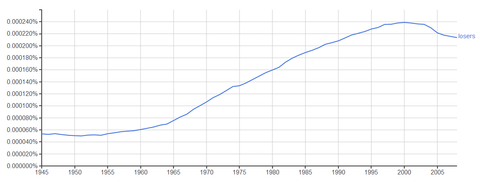
Sure enough, the term “losers” has become much more common since the 1960s. And I think this word usage reflects something real — a growing contempt for the little people.
The ngram graph does indicate that the word "losers" increased in frequency in the last half of the 20th century, at least in published books. But it doesn't actually answer the question that Prof. Krugman asks, since "loser" can be used for many things besides disparaging someone who "who hasn’t made it big, hasn’t gotten rich".
There are literal or semi-literal losers in various sorts of competitions: games, sports, gambling, elections, court cases, awards:
The Spurs (losers to the Suns) were without injured starters David Robinson, Willie Anderson and Rod Strickland, and the Lakers (losers to the Blazers) were minus Magic Johnson (retired after testing HIV positive), James Worthy and Sam Perkins.
The Chicago Cubs, the lovable losers, are once again making a run at the playoffs.
But Haitians now have to rise to this opportunity to create a political system of local culture where violence isn't the solution to the problem, where the losers of elections are respected, as well as the winner, where the military is subservient to civilian power.
Asked whether he thought the loser of the California primary should withdraw, he replied: "That's a decision the loser would have to make."
We might then run the risk of not infrequent election of the loser of the popular vote, and it is a risk that may seem prohibitive.
Trading a diamond loser for a heart loser was a most profitable exchange. South was able to trump the next heart, keeping East from gaining the lead.
Hence, the honor roll supplements the valedictorian, and the quiz-show loser wins a Cadillac.
Russia can not hope to be anything but the loser in an all-out war.
The costs of litigation are notoriously high, especially the loser's side in an appeal.
The high court usually waits until the loser in such an action has had twenty-five days in which to ask for a rehearing.
There are literal losers of weight, money, and so on:
"I just decided this was going to be it," confided one successful weight loser.
The result was ownership of a group of smallish hospitals, none of them dominant in their market, some of them money losers, and many of them low occupancy in highly competitive urban markets.
Signing stars like Outfielder Richie Zisk to a ten-year, $2.9 million contract made a perennial money loser of the Texas Rangers.
There are good losers and bad losers and sore losers, none of whom are especially likely to be "little people":
"I like a gambling woman and a good loser," he says. "I like class in horses and women."
Accordingly, the battle is not over yet. Khrushchev is not the world's ideal of a good loser.
[That machine] isn't a good loser, and it isn't a bad loser. The damned thing doesn't even know it lost, and even if it did, it wouldn't care.
Andrew was delighted to find that besides being a braggart Charles was a liar and a bad loser.
So tonight we ask, are Republicans being sore losers, or simply serving their constituents?
There are people who are losers by virtue of being unpopular or unattractive or unhappy or generally denigrated, without any economic or social-class implications:
Cher is somewhat of a loser. She's lonely. She's unhappy. She's very miserable.
Actually, she'd never had a boyfriend. He'd probably think she was a loser if she said that, though.
Nerds all love it when there's a hot chick whom they know is one of them," says Family Guy creator Seth MacFarlane, who cast Kunis as Meg, the show's "frumpy, pathetic loser," as he puts it, more than a decade ago.
(The Family Guy character Meg is a useful case in point, since she's obviously in the same socio-economic class as the other members of her family.)
And finally, there are metaphorical losers who are simply worse off as a result of some change, and may not even be people:
He said that everyone would be the gainer if Mr. Nixon were successful — and that everyone would be the loser if Mr. Nixon were not able to come to grips with' the pressing problems of the day.
Whoever wins the great European struggle, liberty will be the loser.
In the rush to rebuild after the war, archaeology was usually the loser.
So to support Prof. Krugman's theory, we'd need to classify a sample of examples over time, and show that the increased frequency of "losers" really reflects "a growing contempt for the little people", rather than more writing about winners and losers in sports, gambling, politics, law, adolescent social clique formation, and so on.
I don't have time for that exercise this morning, but I'll sweeten the lexico-historical pot by observing that the plural "losers" has increased more than the singular "loser" has (multiplication by 10000 to turn percentages into counts per million):
The ratio between the frequency of "losers" and the frequency of "loser" has gone up from about 0.4 to about 1.4:
The data from the Corpus of Historical American English is noisier, but shows an even stronger overall increase in the frequency of both forms (blue 1s are the frequencies of "loser " by decade, red 2s the frequencies of "losers"):
And a roughly similar increase in the plural/singular ratio:
But does this really reflect "a growing contempt for the little people"? A quick glance at a random sample of "losers" examples from the past couple of decades suggests that even at the end of the change, the proportion of examples expressing socio-economic class prejudice is not large. What then accounts for the increased frequency of the word, and especially of the plural form? I don't know: more on this later.
Update — in a random sample of 100 instances of "losers" from COCA (out of 2719), I could not find any examples that really fit Krugman's story. There were several cases were the competition involved was in the arena of business, but where the losers in general were hardly "little people", e.g.
The idea of radically simplifying the tax system remains an orphan issue because (a) it's almost impossible to rejigger taxes without someone paying a little bit more, and the losers hire lobbyists; (b) all politicians love the game of making things happen with tax credits, because you get to be both a social engineer and a tax-cutter; and (c) it has tended to be a pet project of ideology-driven Republicans like Steve Forbes, whose real agenda was to cut taxes and starve the government.
Institutional investors, mutual funds and bank trust departments were among the biggest losers in Thursday's U.S. Surgical stock plunge
There are some others that might be made to fit, but seem to me to be more nonconformist losers than socio-economic losers:
In keeping with his past musicals animating the passions of the certifiably insane (" Anyone Can Whistle ") and mass murderers (" Sweeney Todd "), this songwriter gives genuine, not mocking, voice to the hopes, fears and rages of two centuries' worth of American losers, misfits, nuts, zombies and freaks.
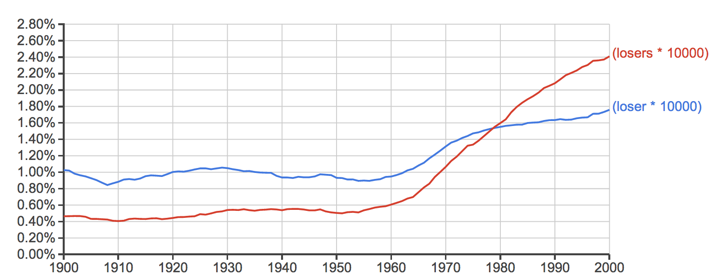
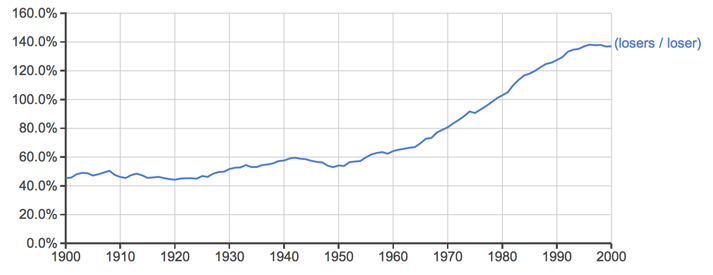
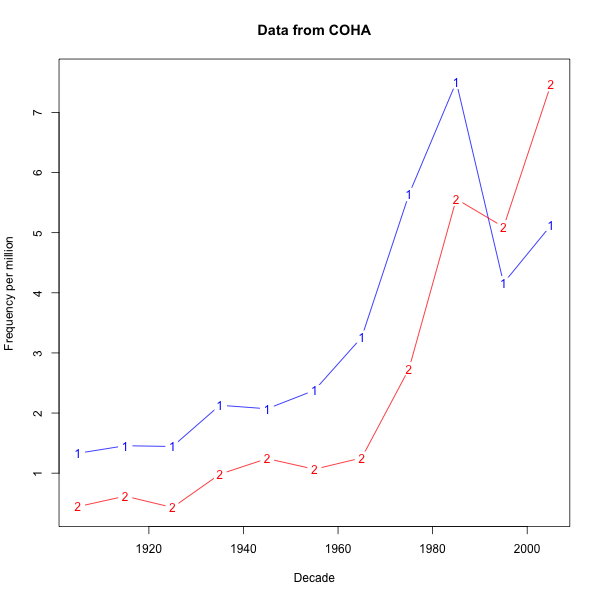
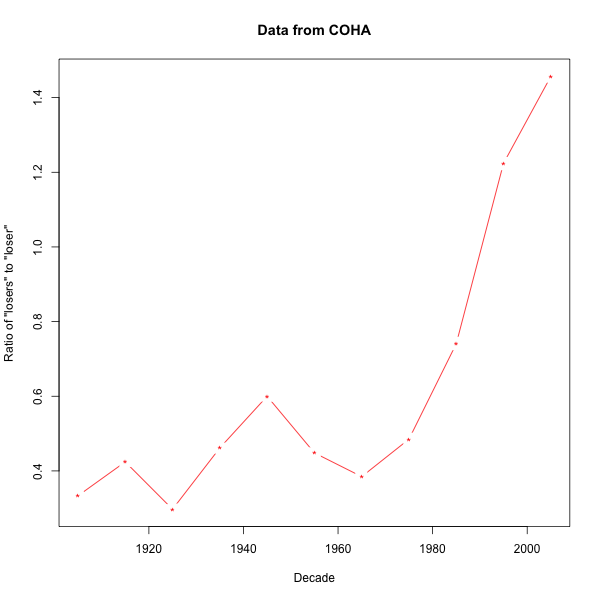
Mark Dunan said,
January 14, 2014 @ 7:44 am
One thing I can think of for the surge in the plural form "losers" is that in the '90s it became popular to call someone who was worthy of contempt or otherwise undesirable a "loser", giving rise to sentences like:
"Why do you hang out with those losers?"
"These two losers are always on TV; they aren't funny at all."
Did people talk like this before the 1960s? I don't know if this slang usage is still popular, and there is a slight dip after 2005 which might reflect the loss of this epithet.
Also, the baseball fan in me feels obliged to point out that there has only been one 20-game loser since 1980 (before which there were many; 20-game winners are not yet rare). Spare a thought for Mike Maroth of the 2003 Tigers, who must bear this burden until another appears.
[(myl) I think you're right that losers as a general derogatory term grew in popularity (and maybe even originated) in the second half of the 20th century. And the same sense also became commoner in the singular as well. But I'm skeptical that this change had much to do with socio-economic status.]
D-AW said,
January 14, 2014 @ 7:58 am
FWIW:
D-AW said,
January 14, 2014 @ 8:04 am
I'll try that again (FWIW):
or: http://poetry-contingency.uwaterloo.ca/wp-content/uploads/2014/01/losers1.png
GeorgeW said,
January 14, 2014 @ 8:35 am
I was surprised that Krugman, who often criticizes other economists and policy makers for not being scientifically rigorous in their economic claims, would make a proposal like this without any empirical support.
I suspect that some conservative politicians do see "the little people" as "losers" (e.g. the famous 47%), but they would not likely use the word "loser" in a context such that it would be in the for Google Ngram database. This would be the kind of thing said over drinks at the club.
Alexander said,
January 14, 2014 @ 8:37 am
The rise in "loser"s looks small compared to the drop in "fool"s. We'll let David Brooks figure that out.
[(myl) But (a) the fall in fool(s) happens mostly before the rise in loser(s) starts:
and (b) the absolute change, as you say, is much larger for fool(s) (roughly a change from 25 per million to 13 per million) than for loser(s) (roughly 1.5 per million to 4.1 per million), so we'd need to figure out what other insults all those word-banked fools from 1930 to 1965 got spent on between 1965 and 2000… Though as you suggest, I'm sure the Mr. Brooks would be up to the task.]
J. W. Brewer said,
January 14, 2014 @ 9:56 am
I[m not sure whether Krugman should get half-credit for actually looking at empirical data, even if it turned out not to really be the right data (at least without additional filtering no one seems to know how to do methodologically) for the point he was trying to support. It would be as if a pundit had had his research assistant actually determine that such-and-such recent president actually used a particular kind of pronoun twice as often as Rutherford B. Hayes had although it turned out that review of the actual pronoun uses in the two different contexts did not support the pundit's thesis about what such pronoun use ought to be presumed to indicate. Baby steps . . .
J. W. Brewer said,
January 14, 2014 @ 10:08 am
There are some phrases you can search to narrow in on more specifically-pejorative senses, such as "total loser" and "such a loser," both of which have dramatically spiked up in the google n gram viewer since c. 1970 (although maybe they were just new idioms?), but I don't think that's going to disentangle the broader "socially-unpopular/awkward" sense from Krugman's income-level sense.
Brett Reynolds said,
January 14, 2014 @ 10:18 am
Is there any generally accepted way of determining statistical significance when we talk about changes in word frequency like this?
[(myl) Each "frequency" implicitly represents a count of x in a sample size of N, and there are a variety of standard ways of estimating confidence intervals for individual frequencies, or for slopes (or other trends) in a time series of such frequencies.
In the examples that we're talking about, the numbers e.g. for "losers" in COHA are things like 26 out of 24,144,478 in the 1940s vs. 196 out of 29,479,451 in the 2000s. A binomial test (e.g. binconf() in R's Hmisc package) tells us that the 95% confidence interval for the first proportion is between 1.08 and 2.06 per million, while the 95% confidence interval for the second proportion is between 5.8 and 7.6 per million.
This doesn't tell us why there was a change — it could be because the second sample is highly enriched in sports pages and political reporting relative to the first one (which is unlikely for COHA) rather than because the underlying word usage actually changed — but it does tell us that these results are very unlikely to be "sampling error", i.e. the results of different random samples taken from the same population.
The Google ngram samples are much greater, and so the error bars are likely to be even tighter, though the sampling process (especially over longer stretches of time) is more likely to show the effects e.g. of topical fashions in publishing.]
J. W. Brewer said,
January 14, 2014 @ 10:19 am
The valid pop sociology point btw is not necessarily a left-v.-right one, but is about the dark side of "meritocracy." A reasonably high percentage of Americans who have done well in recent decades are emotionally invested in the proposition that the U.S. is more "meritocratic" than it used to be, at least in the sense that e.g. compared to a few generations back admissions to elite colleges and grad schools are more driven by standardized test scores, grades and a certain obsessive-compulsive work ethic (all considered, perhaps a little too uncritically, to count as "merit") rather than by family prominence, being part of the "right" ethnic group, etc. This rather naturally leads members of the new elite (especially the sort credentialed by diplomas from such elite schools and/or work experience at some sort of elaborately self-consciously "meritocratic" employer which could be anyone from Google to McKinsey) to believe that they objectively deserve their success, and thus tend to lack the sense of there-but-for-fortune and accompanying sense of noblesse oblige that more self-aware members of prior pre-meritocratic elites sometimes had. It naturally follows that in a meritocracy, people with less success presumptively end up that way because . . . they have less merit.
I think it's a pretty plausible pop-sociology account of the last half-century in America (and I'm not someone who typically agrees with Krugman on stuff, and perhaps here I'm seeing approximately the same result but accounting for it somewhat differently than he would), but of course I am not going to assume that this sociological phenomenon is *necessarily* going to produce any particular pattern of language usage as an epiphenomenon.
[(myl) There is probably sociological data out there about how American attitudes towards meritocracy have developed over the decades — whether it's a good idea, and to what extent various aspects of society are actually meritocratic.
There's a recent study suggesting that people who rank themselves higher in social class tend to have more essentialist ideas about the determinants of success (though the effect sizes are rather small).
But the idea that people's rewards should be commensurate with their contributions (as opposed to their genes) is a suspiciously left-wing one… I remain puzzled about why people like Paul Krugman don't point out that the Republican "war on the poor" is substantially socialist at least in sloganizing if not in motivation.]
Usual John said,
January 14, 2014 @ 11:08 am
I'm a fan of using language change to discern historical movements, but it has to be done with caution, and "loser" probably is not a very good candidate for it. I expect that the increased popularity of "loser" is difficult to ascribe with confidence to anything other than normal changes in the popularity of slang terms.
Impressionistically, I would say that there was a high level of contempt for the unsuccessful in the 1920s. It pervades Mencken's Smart Set in particular but is readily seen elsewhere as well. The Great Depression, New Deal, and World War II seem to have had an egalitarian effect, and while in recent decades sympathy for the "little people" may have been reduced, I don't at all think we're back to the level of Mencken.
Y said,
January 14, 2014 @ 1:53 pm
A good proxy for 'loser' in this sense is the n-gram 'some loser'. This goes back to the early 1900s, but doesn't take off until 1980 or so.
J. W. Brewer said,
January 14, 2014 @ 2:33 pm
It would not surprise me if Krugman had rather essentialist/meritocratic views about the reasons for his own personal success and public prominence. But I guess what you would really need to do to test his sociolinguistic hypothesis is not only identify an increased rate of uses of "loser" in the sense he is concerned with but try to figure out who is and isn't using that sense and how that matches up with their own social class and self-proclaimed political affiliations / policy preferences.
un malpaso said,
January 14, 2014 @ 3:04 pm
Somebody has to mention "I'm a Loser" by the Beatles! Recorded in 1964.
[(myl) Why mention it when you can watch it on YouTube:
So your theory is, it's not the Republicans, it's the Beatles?]
J. W. Brewer said,
January 14, 2014 @ 3:24 pm
You'd need to trace the historical transition from the Beatles to, at a minimum, Beck's "Loser" in the 1990's, via such way stations as the Grateful Dead's "Loser" (originally on a Garcia solo LP), Bob Seger's "Beautiful Losers" (an NP he nicked from Leonard Cohen), and Tom Petty's "Even the Losers" (they "get lucky sometimes," he notes hopefully). There's also the predestinarian Heartbreakers (the Johnny Thunders ones, not the Tom Petty ones) classic variously known as "Born to Lose" and "Born Too Loose." And a bunch of other things on the wikipedia "Loser" disambiguation page I'm not really familiar with. Not to mention "Now his nurse, some local loser / She's in charge of the cyanide hole, etc. etc." but of course Dylan outed himself in his gloriously unedited stream-of-conscious memoirs as a Barry Goldwater fan, so Krugman can take that and run with it.
[(myl) And don't forget the "losers" (plural) songs. Plus the "winner(s)" songs. Overall a depressing playlist, though.]
Sili said,
January 14, 2014 @ 4:22 pm
"you losers" and "those losers" show similar trends with a sharp increase post-1960, but the data are noisy.
Y said,
January 14, 2014 @ 5:47 pm
Do Spanish speakers anywhere really use the word perdedor, or did Beck just make that up?
Bob Ladd said,
January 14, 2014 @ 6:22 pm
Data point: In the College Undergraduate Slang Study, which I carried out in 1968 with my fellow linguistics majors Collin Baker and Tom Robb, we collected questionnaire data from about 400 students at 18 colleges (mostly in the Northeast). The questionnaires provided categories of meaning (e.g. "an athletic person", "a person who studies all the time") and asked for slang terms used to express those meanings. Not very refined, but it does provide at least some data about the meaning of loser near the beginning of the period in which (according to Google's database) it has become more common.
Two things stand out: first, loser was one of the most common responses to the questionnaire items "a person who always does the wrong thing" and "a person without much social or academic ability", but not to "a small or insignificant person"; second, it was given as a response by female respondents roughly three times as often as by male respondents. The first of these suggests that MYL is right in thinking that the term is more about "nonconformist losers" than "socio-economic losers" (or at least it was when it started becoming more widespread). Perhaps Krugman would have an explanation for the second, but predominantly female use is not the first thing I would expect to find if the term really is about contempt for people who haven't Made It.
David Morris said,
January 14, 2014 @ 6:39 pm
What has happened to 'a winner/winners' in the same period?
Mark Stephenson said,
January 14, 2014 @ 6:52 pm
"Nerds all love it when there's a hot chick whom they know is one of them." Since this is LanguageLog, can I be a pedant and point out that this should be "who", not "whom"?
Ran Ari-Gur said,
January 14, 2014 @ 8:33 pm
@Mark Stephenson: This being Language Log, you're about seven years too late. Dr. Zwicky discussed the use of whom for the "extracted subject of an object clause (ESOC)" in his 2007-01-23 post "Whom shall I say [ ___ is calling ]?" (and in a few posts since then; just search for "ESOC").
Graeme said,
January 14, 2014 @ 10:20 pm
Krugman being a humanist would deprecate the term 'loser' as a social put down as well. I suspect in his mind he hears both normatively pejorative uses and his ears prick up. As mine do. But he's deaf to the more descriptive uses as they do not offend.
As for the socialist argument, like most leftists in recent decades he would be following Marx's 'from each according to abilities to each according to needs' principle of social justice and communal effort, rather than the more obscure 'contributions' principle which was meant to be an interim concept en route to the communist ideal of fulfilling 'needs'.
mollymooly said,
January 15, 2014 @ 7:38 am
As Magda in There's Something About Mary pointed out to me,* loser is not only the opposite of winner but also the opposite of keeper ["someone worth keeping"]. I'm not sure this factoid is salient enough for enough speakers to be relevant to the present discussion.
*'If Puffy starts yapping, he's a loser. If he likes him, honey, then you've got yourself a keeper.'
Boris said,
January 15, 2014 @ 1:04 pm
After reading this entire discussion, I'm still not sure what sense of "loser" Paul Krugman is referring to. I only know of two (broad) definitions of "loser". One is the literal meaning, one who lost something. This would only include poor people if they were once rich, so I don't see how its relevant. The other is the "socially undesirable" meaning, which, I suppose, could include anyone who is socially undesirable in a given circle, but if there is a rise in a particular group being socially undesirable, the frequency of the word "loser" would not really be affected unless that group is disproportionately undesirable verses all other such groups combined.
About the "Beatles" song, I always thought that the slang term "loser" did not exist or was not very dominant at the time and place the song was written, because it seems to me that it is using "loser" in the literal sense, but, to me, "I'm a loser" can only be used in the slang put-down sense. When I do a Google search, music titles and lyrics, my intuition seems correct. One possible exception is Michelle Bachman's "God, I'm a loser. God, I turn people off." It's not clear, but it is at least possible that she meant that she keeps losing, but I would tend to interpret it the other way too.
Boris said,
January 15, 2014 @ 1:06 pm
What I meant to say was "excluding music titles and lyrics"
J. W. Brewer said,
January 15, 2014 @ 2:40 pm
Are the results of Bob Ladd's '68 fieldwork posted out on the web somewhere? I would think they might be of general interest beyond this specific word.
Brian Page said,
January 15, 2014 @ 6:30 pm
I think if you find that spike continue to go up and up after the 60's to the present it represents a growing linguistic recognition that monetary success is the only type of success worth recognizing while marking the dramatic growth in inequality over the last 30 odd years.
GeorgeW said,
January 15, 2014 @ 8:32 pm
@Boris
One definition which is the meaning I think Krugman had in mind is: "A person who fails frequently or is generally unsuccessful in life."
The presumption is that the "loser" is personally responsible for their lack of success because of laziness, complacency, etc.
J. W. Brewer said,
January 15, 2014 @ 9:07 pm
To tie this back to other LL coverage of the NY Times punditocracy, I just saw someone on facebook criticizing something dopey-sounding in a David Brooks column, who was amused that the Brooks column was followed (I guess in the hard-copy edition, as a function of how the op-ed page was laid out) by the notation "Paul Krugman is off today," which he found amusingly ambiguous.
Geoff Nunberg said,
January 15, 2014 @ 11:29 pm
It helps, where possible, to restrict the search to an environment that selects for the sense you're after. Search on "what a loser" and it's clear we're dealing with a discrete sense of the word, which entered the language quite abruptly in the 70s and spread rapidly thereafter.
[(myl) In this case, as often, I suspect that the evidence in books is a few years behind usage in the schools and streets. But in any case, the frequency plot doesn't tell us what the new usage meant or means. Surveying a small historical sample suggests to me that the new figurative meaning was more something in the range of "unpopular", "awkward" (or sometimes just a term of nearly-contentless denigration), rather than "economically unsuccessful".]
Bob Ladd said,
January 19, 2014 @ 5:42 am
@J W Brewer: The College Undergraduate Slang Study (CUSS) from 1968 is not on the web as far as I know. The original materials were lodged 10 or 15 years ago in the archive of the State Historical Society of Missouri (specifically in their collection of stuff on language). The "original materials" include the actual filled-in questionnaires and a couple of boxes of computer punch cards. It would be quite an operation to convert this all to electronic form suitable for the web.
Please feel free to email me if you want to know more about what we did.